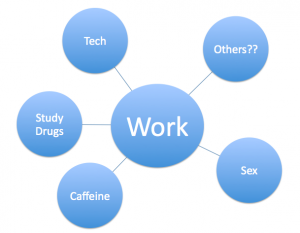What is Addiction?
Addiction is a complex topic. There’s a lot of information out there that doesn’t always agree depending on who you ask or what you read. Therefore, we’ve taken it upon ourselves to define and discuss addiction based on the best and most relevant biological research that we can find. However, the task of presenting this information becomes incredibly difficult unless we can arrive at a conclusion of what addiction actually is.
The DSM 5 describes addiction as a dependence that develops tolerance from use and withdrawal symptoms in abstinence. It also describes how an addict will often consume a substance or engage in a behavior more than they intended, and how they will crave the subject of their addiction. The DSM 5 details that addicts are characterized by failed attempts to cut down, abandoned hobbies due to the addiction, and continued use or activity in spite of negative effects, dangerous situations, and a failure to fulfill other obligations in everyday life.
Some addictions can be related to pleasure-seeking behaviors like drug use, sex, and sugar consumption, or from a need to feel relief. A common way to conceptualize this is drug addiction, where the addict needs a certain drug to feel good and suffers withdrawal when the drug is no longer in their system. Essentially, addiction represents the point at which the addict no longer chooses to do something. Rather, they feel that they need to.
There are a lot of different addictions aside from the common drug model. Some of these addictions are controversial; some people don’t believe that they exist or that they aren’t as valid as others. For example, when Tiger Woods came forward with his case of sex addiction, many people argued that the condition didn’t really exist. This site assesses the validity and science behind several new or up-and-coming addictions in hopes of shedding some light on the matter.
As we explain further, these addictions affect and exploit various mechanisms in the brain. They can affect the functionality of different brain regions and different neurotransmitters. Biology aside, it’s been demonstrated that many addictions are related to and triggered by various social cues and are related to memory and other contextual information.
LINKS TO OTHER ADDICTIONS
Addictions aren’t experienced in isolation. People who are addicted to one behavior oftentimes are addicted to other behaviors or substances. Below is an example of how workaholism connects to other addictions:

